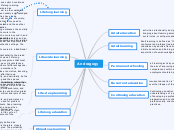Andragogy
Adult education
activities intentionally designed for the purpose of bringing about learning among those whose age, social roles, or self-perception define them as adults
Sharan B. Merriam and Ralph G. Brockett (1997: 8) http://infed.org/mobi/what-is-adult-education/
Adult learning
Adult learning is defined as ‘the entire range of formal, non-formal and informal learning activities which are undertaken by adults after a break since leaving initial education and training, and which results in the acquisition of new knowledge and skills
Permanent schooling
all learning activity undertaken throughout life, with the aim of improving knowledge, skills and competences within a personal, civic, social, and/or employment-related perspective
Coven, R. Second International Handbook of Comparative Education. London: Springer https://www.researchgate.net/profile/Anthony_Welch3/publication/238486601_Mammon_Markets_and_Managerialism_-_Asia-Pacific_Perspectives_on_Contemporary_Educational_Reforms/links/578ca20d08ae7a588ef3afe3/Mammon-Markets-and-Managerialism-Asia-Pacific-Perspectives-on-Contemporary-Educational-Reforms.pdf#page=593
Recurrent education
recurrent education is ‘the distribution of education over the lifespan of the individual in a recurring way’
Jarvis, P. (2004). Adult Education and Lifelong Learning
Continuing education
Continuing education based on societal understandings of a profession and on the importance of developing a professional identity through preparation and continuing involvement in professionally oriented knowledge, values and practices.
Gross-Gordon, J.M., Rose, A.D., Kasworm, C.E. (2016). Foundations of Adult and Continuing Education
Lifelong learning
The concept of lifelong learning is extremely confusing since it combines individual learning and
institutionalized learning. Learning can be under FROM ADULT EDUCATION TO LIFELONG LEARNING
64 stood as an individual process which continues throughout the whole of life – lifelong learning.
But learning can also be considered as institutionalized and formalized: in other words the
educational system. It has been widely acknowledged that many learning opportunities have to be
provided by the non-educational sectors of society, such as the corporations, and that there need to
be partnerships between education and those other providers of learning opportunities.
Consequently, lifelong learning embraces the socially institutionalized learning that occurs in the
educational system, that which occurs beyond it, and that individual learning throughout the
lifespan, which is publicly recognized and accredited
Jarvis, 1996
Lifewide learning
Lifewide learning (LWL) is a teaching strategy and an approach to learning and personal development that involves real contexts and authentic settings. The goal is to address
different kinds of learning not covered in a traditional classroom.
Lifewide learning adds important detail to the broad pattern of human development we call lifelong
learning life. Lifewide learning recognizes that most people, no matter what their age or circumstances,
simultaneously inhabit a number of different spaces – like work or education, being a member of a
family, being involved in clubs or societies, traveling, taking holidays, and looking after their own
well-being mentally, physically, and spiritually. So the timeframes of lifelong learning and the spaces
of life-wide learning will characteristically intermingle, and who we are and who we are becoming are the consequences of this intermingling.
Life-deep learning
is an approach and an attitude to learning, where the learner uses higher-order cognitive skills such as the ability to analyse, synthesize, solve problems, and thinks meta-cognitively in order to construct long-term understanding. It involves the critical analysis of new ideas, linking
them to already known concepts, and principles so that this understanding can be used for problem solving in new, unfamiliar contexts. Deep learning entails a sustained, substantial, and positive influence on the way students act, think, or feel.
Lifelong education
Lifelong education includes formal, non-formal and informal patterns of learning throughout in life cycle of an individual for the conscious enhancement of the quality of life. (Dave, 1976).
Dave, R.H. (1976). Foundations of Lifelong Education: Studies in Lifelong Education
Ubiquitous learning
Ubiquitous learning is often simply defined as learning anywhere, anytime and is therefore closely associated with mobile technologies. The portability of computers and computing devices has blurred the traditional lines between formal and informal learning. This also considered to be learning that is situated and immersive, and this could take place from the traditional classroom in a virtual environment
